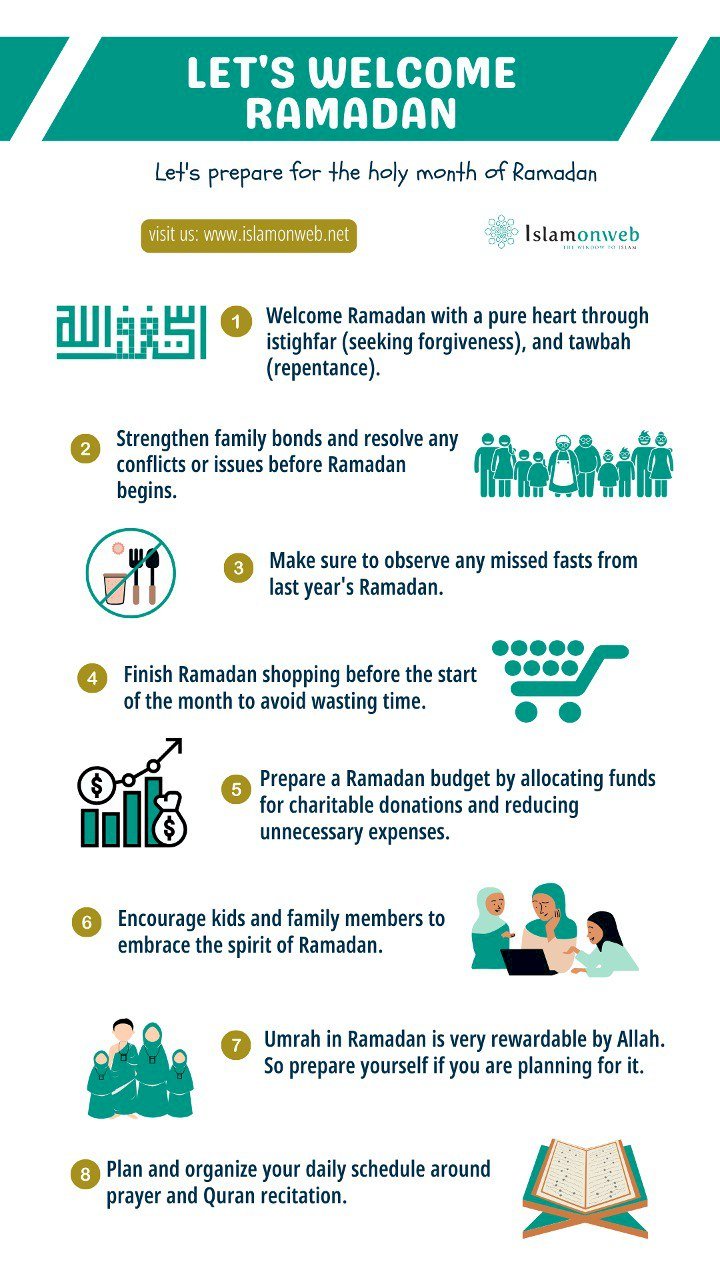10 Tips to Welcome Ramadan
Ramadan, a time of blessings for believers, is approaching. During this sacred month, hearts are filled with faith, consciousness, and a determination to resist temptations. It is a period marked by increased devotion in worship and a spirit of mutual competition among people. In the words of the Prophet ﷺ, "When Ramadan begins, the gates of paradise open, the gates of hell close, and the devils are chained."
To fully embrace the spiritual essence of these holy days, believers prepare well in advance, expressing their anticipation through prayers even before months. Believers used to pray "O Allah! Grant us blessings in Rajab and Sha'ban, and bring us to Ramadan," expressing their eagerness for the arrival of Ramadan.
What steps can we take to welcome and observe Ramadan meaningfully? Here are some practical guidelines:
1. Open Your Heart to Ramadan:
Cultivate mental purity as the foundation for all actions. Seek redemption from sins, stand firm against temptations, and engage in sincere repentance. Develop a commitment to observing obligatory acts and pay special attention to the practices of the Sunnah.
2. Strengthen Family Bonds:
Recognize the significance of family ties. Maintain good relations with relatives, visit them, or stay connected through various means. Avoid unnecessary disputes and pay special attention to the relationship with parents. The Prophet ﷺ cautioned us that Allah does not accept the actions of those who sever ties of kinship. To ensure the acceptance of our Ramadan, it is crucial to maintain warm relationships with all our relatives.
3. Settle All Conflicts:
In case of conflicts with individuals in our lives, be it friends, neighbors, or co-workers, take the initiative to resolve them. Remember the Prophet's ﷺ advice not to prolong disputes with fellow Muslims beyond three days. The noblest person is one who speaks the truth without harboring any resentment or jealousy. Therefore, strive to rid your mind of such grudges.
4. Effective Time Management:
Initiate time management practices in preparation for Ramadan. Avoid spending time in unproductive activities like chat rooms, excessive TV watching, or mobile gaming. Refrain from engaging in activities that do not contribute to spiritual growth. Utilize the internet wisely, allowing access only to essential and beneficial content such as Islamic websites. Create a time management chart that includes essential daily activities and adhere to it strictly.
5. Complete the Missed Fasts:
Individuals who have missed obligatory fasts and have not completed them yet should prioritize completing them at the earliest opportunity. Women may have missed fasting during the previous Ramadan due to menstruation or pregnancy. It's important to note that for those who do not observe Sunnah fasting, engaging in Sunnah fasting is prohibited after the fifteenth day of Sha'ban. However, completing missed mandatory fasts is permissible even after the fifteenth of Sha'ban.
6. Ramadan Shopping:
To minimize time spent in shopping malls and supermarkets during the nights of Ramadan, it is advisable to purchase necessary items in advance. Exercise moderation in shopping and refrain from unnecessary purchases to prevent the nights of Ramadan from becoming solely focused on food and feasting. For many individuals, Ramadan tends to be the most expensive month of the year due to excessive and unnecessary shopping and feasting.
7. Ramadan Budget:
In the Ramadan budget, priority should be given to charity. Allocate a significant portion for Sadaqah by trimming unnecessary or unwanted expenses. Exercise caution in extending help to deserving family members and relatives. Individuals who regularly give Zakat during Ramadan should calculate it accurately and ensure it reaches those who are eligible.
8. Umrah:
Umrah during Ramadan holds great sanctity. Those with financial capacity should plan well in advance for Umrah. Additionally, bear in mind that performing the Fajr prayer in congregation, staying in remembrance of Allah and dhikr until sunrise and then performing two rak'ahs of duha prayer, carries the reward equivalent to a complete Hajj and Umrah.
9. Prepare Families for Ramadan:
Encourage all family members to welcome Ramadan together. Educate children about Ramadan fostering excitement for it and motivating them to observe fasting. Efficiently organize household responsibilities to support wives in managing chores and worship during Ramadan. Introduce informative books and websites to the household to enhance their Islamic knowledge.
10. Quran Recitation/Studies:
Recognize the profound connection between the Quran and Ramadan. Plan time for consistent Quran recitation and study and strive to accomplish as many 'khatm' (complete recitations of the Quran) as possible, based on individual time availability and circumstances.
For those who can manage, reciting one Juz (part) after each prayer allows for completing 5 Khatms during Ramadan. Recognizing various commitments, some might find this challenging. As an alternative, reciting one Juz after three daily prayers, such as Fajr, Taraweeh, and Asr, enables the completion of three khatms. Each session takes approximately 20 minutes.
For those with time constraints, reciting four pages of the Quran after each prayer (taking less than 5 minutes) allows for completing one juz per day (5*4 = 20). This way, at least one khatm can be achieved during Ramadan.
For those unfamiliar with Quranic recitation, Ramadan provides an excellent opportunity to learn. Explore courses for Quranic recitation and study offered by local masjids, Islamic centers, or online platforms. Seek guidance from knowledgeable teachers or utilize online resources to initiate a learning journey.
O Allah! Grant us the grace to witness the remaining days of Shaban and usher in Ramadan. Bestow Your blessings upon us during this time, and may we observe fasting, night prayers, and engage in the recitation and study of the Quran with sincerity and diligence.

About the author: Faisal Niyaz Hudawi is a postgraduate of Darul Huda Islamic University, Kerala, India, in Islamic Studies. His interests include Islamic finance, Hadith literature, and other Islamic studies. He is interested in digital activism and founded Islamonweb.net and thesite.in.
Disclaimer
The views expressed in this article are the author’s own and do not necessarily mirror Islamonweb’s editorial stance.

























Leave A Comment